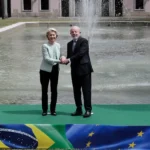
Beijing, Brussels and Washington intensify their strategies to control supply chains, but China always seems to be one step ahead
The trade war between the planet’s great economic powers has taken on new contours. While the United States, the European Union and China wage a silent — and increasingly sophisticated — dispute for control of global supply chains, Beijing has demonstrated a strategic skill that puts it at an advantage.
The US government, under the administration of Joe Biden, popularized the expression “small yard, high fence” to justify export controls on advanced chips. The idea would be to protect the most sensitive US technology without compromising international trade. In practice, however, this limitation proved to be illusory. Semiconductors, essential for artificial intelligence, are the heart of the new digital economy — and restricting them directly affects the global balance of technological power.
Meanwhile, China reacted with precise and forceful measures. Beijing has expanded controls on exports of rare earths — minerals essential for the manufacture of chips, batteries and electronic equipment —, hitting Western industry hard. The new restrictions are expected to raise prices and reduce the competitiveness of manufacturing outside Chinese territory, a move that further strengthens the Asian country’s industrial power.
This control over strategic inputs has real consequences. Recently, delays caused by Chinese barriers have halted car assembly lines in countries ranging from Illinois, in the United States, to India. Former President Donald Trump’s reaction was predictable: he threatened new tariffs. Europe, which initially seemed immune to the rare earths crisis, now finds itself at the center of an unprecedented geopolitical dispute.
In October, the Dutch government intervened in chipmaker Nexperia — a company of Dutch origin but controlled by Chinese capital — alleging “governance deficiencies” and risks to Europe’s technological capabilities. Beijing responded immediately, suspending Nexperia’s international exports. Although production takes place in European factories, most of the chip packaging is done in Dongguan, China — and that is precisely where the blockages come from.
The impact was profound: according to local reports, almost half of European automakers use chips produced by Nexperia, in addition to 86% of medical device companies, 95% of mechanical engineering and the entire defense industry on the continent. In other words, the West relies heavily on a chain controlled by Beijing. If China does not release exports, the European industrial base could face an unprecedented crisis.
As diplomats from The Hague, Brussels and other capitals negotiate an exit with Beijing, analysts are already discussing the so-called “escalation to negotiation” strategy — a risky move that would include limiting the sale of chipmaking equipment and aerospace components to China.
The problem is that the three largest economies in the world — China, the European Union and the United States — are trapped in the same dilemma: how to impose high costs on their rival without harming their own economy? Beijing, for example, still depends on semiconductors made in Taiwan and the US dollar. Washington, on the other hand, fears the negative reaction of financial markets to any escalation, something that could directly affect the government’s popularity. The difference is that Xi Jinping, without midterm elections and with control over large state funds, can act more freely than any Western leader.
There is also an industrial intelligence factor at play. The complexity of supply chains is such that not even large corporations fully understand the origin and flow of their inputs. By demanding specific licenses for the export of rare earths, China not only gains bargaining power, but also visibility on the global map of technological production — something it can use surgically in future disputes.
This long-term vision is not new. Still in 2020, at the height of the pandemic, Xi Jinping declared that China’s goal was to “reduce the dependence of international production chains on China”. A calculated paradox: while the West sought to reduce its dependence on the Asian giant, Beijing worked to ensure that the world continued to need it.
The Covid-19 crisis should have led companies to abandon the model “just in time” — based on minimum stocks and fast deliveries — in favor of “just in case”more prepared for interruptions. But by carefully timing the supply of rare earths and other inputs, China has done exactly the opposite: turned global dependence into an economic weapon.
Ultimately, what seemed like a trade dispute turned into a war of resilience and information. And for now, all routes lead to Beijing.
Source: https://www.ocafezinho.com/2025/11/09/por-que-a-china-continua-vencendo-a-guerra-comercial-global/

